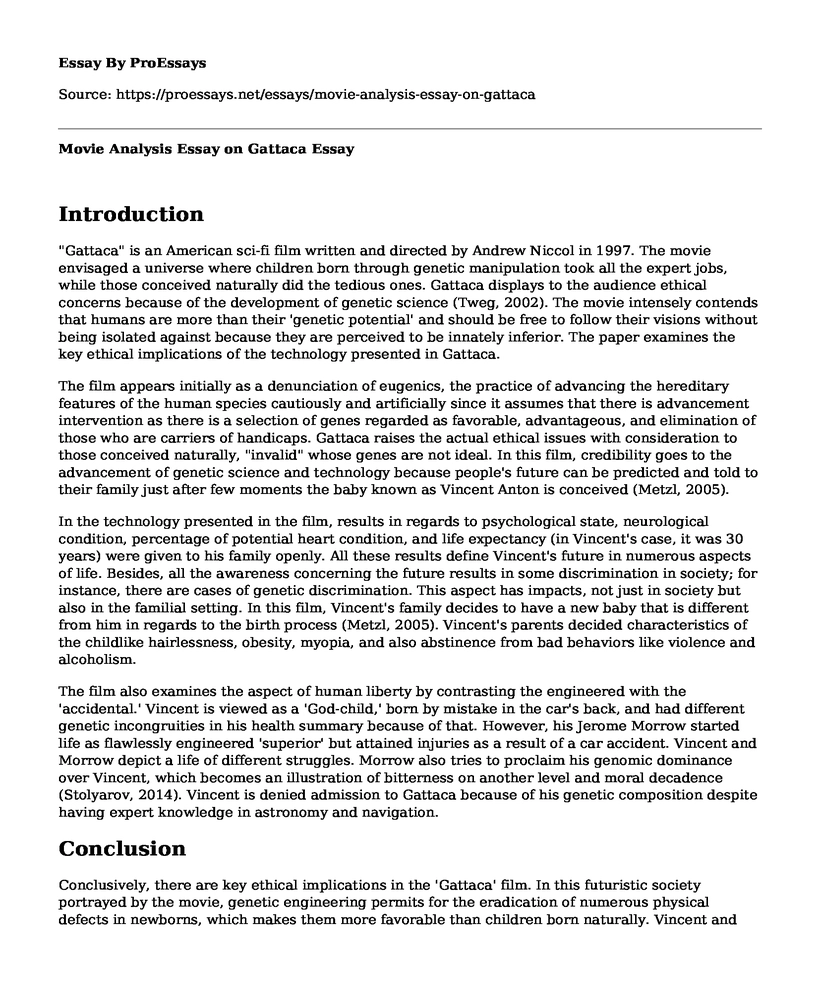Introduction
"Gattaca" is an American sci-fi film written and directed by Andrew Niccol in 1997. The movie envisaged a universe where children born through genetic manipulation took all the expert jobs, while those conceived naturally did the tedious ones. Gattaca displays to the audience ethical concerns because of the development of genetic science (Tweg, 2002). The movie intensely contends that humans are more than their 'genetic potential' and should be free to follow their visions without being isolated against because they are perceived to be innately inferior. The paper examines the key ethical implications of the technology presented in Gattaca.
The film appears initially as a denunciation of eugenics, the practice of advancing the hereditary features of the human species cautiously and artificially since it assumes that there is advancement intervention as there is a selection of genes regarded as favorable, advantageous, and elimination of those who are carriers of handicaps. Gattaca raises the actual ethical issues with consideration to those conceived naturally, "invalid" whose genes are not ideal. In this film, credibility goes to the advancement of genetic science and technology because people's future can be predicted and told to their family just after few moments the baby known as Vincent Anton is conceived (Metzl, 2005).
In the technology presented in the film, results in regards to psychological state, neurological condition, percentage of potential heart condition, and life expectancy (in Vincent's case, it was 30 years) were given to his family openly. All these results define Vincent's future in numerous aspects of life. Besides, all the awareness concerning the future results in some discrimination in society; for instance, there are cases of genetic discrimination. This aspect has impacts, not just in society but also in the familial setting. In this film, Vincent's family decides to have a new baby that is different from him in regards to the birth process (Metzl, 2005). Vincent's parents decided characteristics of the childlike hairlessness, obesity, myopia, and also abstinence from bad behaviors like violence and alcoholism.
The film also examines the aspect of human liberty by contrasting the engineered with the 'accidental.' Vincent is viewed as a 'God-child,' born by mistake in the car's back, and had different genetic incongruities in his health summary because of that. However, his Jerome Morrow started life as flawlessly engineered 'superior' but attained injuries as a result of a car accident. Vincent and Morrow depict a life of different struggles. Morrow also tries to proclaim his genomic dominance over Vincent, which becomes an illustration of bitterness on another level and moral decadence (Stolyarov, 2014). Vincent is denied admission to Gattaca because of his genetic composition despite having expert knowledge in astronomy and navigation.
Conclusion
Conclusively, there are key ethical implications in the 'Gattaca' film. In this futuristic society portrayed by the movie, genetic engineering permits for the eradication of numerous physical defects in newborns, which makes them more favorable than children born naturally. Vincent and Jerome Morrow illustrate the perfect difference. Their different genetic composition makes Morrow the ideal child in numerous cases. This is an unethical concept that the technology illustrates in this movie. Vincent is seen to have errors when he acquires particular ailments in later life while Morrow is given the upper hand in everything.
References
Metzl, J. (2005). Difference and identity: A special issue of Literature and medicine. Baltimore: Johns Hopkins Univ. Press.
Stolyarov, G. (2014, July 4). An Analysis of Ethical Issues in the Film "Gattaca." Retrieved from: https://www.rationalargumentator.com/index/blog/2014/07/ethical-issues-gattaca/Tweg, S. (2002). Gattaca. Mentone, Vic: Insight Publications.
Cite this page
Movie Analysis Essay on Gattaca. (2023, Feb 27). Retrieved from https://proessays.net/essays/movie-analysis-essay-on-gattaca
If you are the original author of this essay and no longer wish to have it published on the ProEssays website, please click below to request its removal:
- Organizational Success Through Social Media Tools - Essay Sample
- Character Analysis Essay on Forrest Gump: A Protagonist Who Changed a Storyline
- Censorship: A Relic of an Unlighted Age? - Essay Sample
- Essay Example on Kobe Bryant: Leadership Style, Filmmaker, & Hollywood Stardom
- Mysterious Egyptian Pyramids: A Marvel of Ancient Engineering - Essay Sample
- Essay Example on Shakespeare and Middleton's Timon of Athens: A Tale of Moral Conviction
- Essay Example on Vincent van Gogh: Unlucky in Love & Unconventional Choices







